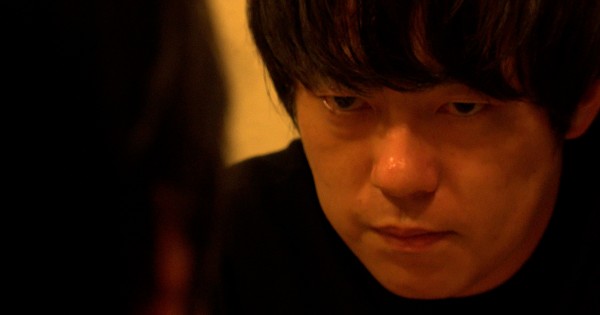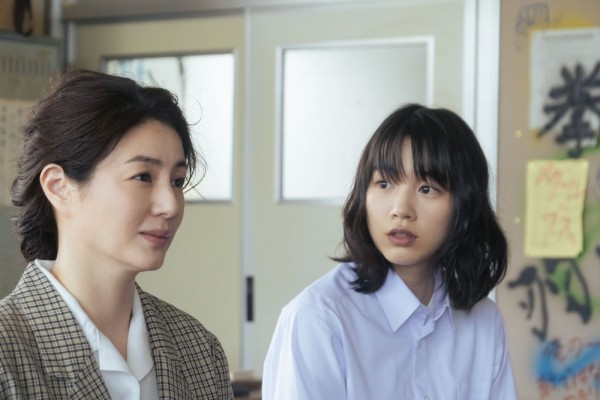-
SANKA: NOMADS OF THE MOUNTAINS 山歌 (Ryohei Sasatani 2022)
RYOHEI SASATANI: SANKA: NOMADS OF THE MOUNTAINS 山歌 (202

RAIRU SUGITA IN SANKA: NOMADS OF THE MOUNTAINS 山歌
Connecting with a vanishing people changes a teenage boy's life
A misfit Tokyo junior high student developing a bond with the local nomads when he visits his father's mountain home is the opportunity to show indigenous values being undermined in 1965 Japan in this quiet drama from Ryohei Sasatani. The youth connects with the scruffy trio he encounters because he feels like a reject himself. He has arrived with a big bruise on his cheek, a chip on his shoulder, and a pain in his heart. He has been out of tune with the world he is in. But that will change.
Fifteen-year-old Norio (Rairu Sugita) is supposed to be studying for his high school entrance exam. But he is angry and unmotivated. Meeting three Sanka, a vanishing tribe of Japanese nomads, first teenage Hana (Naru Komukai), then her father Shozo (Kiyohiko Shibukawa) and her blind grandmother, is a godsend for Norio. When Hana asks Norio what junior high is like he says "Hell." At first she's standoffish toward him, but they get big opportunities to bond. Unsteady in the rough mountain terrain, he falls and hurts himself and she rescues him. Later, she is stung by a bee and collapses with a server allergic reaction. He drags her to a medical station just in time to save her life.
It's obvious Norio likes the beauty and quiet of the mountains. It's a challenge Hana helps him meet, especially when they go on a coming-of-age climb together. Then when it turns out the forest is to be cleared to build a golf course, and Norio's father is involved, the rift between father and son deepens. When Norio says building the golf course here is wrong, his father grants this is true, but there was a war and they must rebuild.
Everything we know of Japan's deep contradictions is quietly limned with intense conviction in this quiet film. Here is a culture with deep aesthetic and moral bonds with the natural environment, where nature and traditional houses' harmony with it are uniquely beautiful and appreciated. Yet this is a nation that is one of the mnost intensely urban and industrial of the EAst. This heartfelt little film, which has been compared to Jissoji Akio's 1972 Poem, focuses on a transitional moment between worlds.
The grandmother curls over and quietly dies and, following Sanka tradition, Shozo immediately buries her under the black earth with Norio and Hana as witnesses. Time passes. Norio's relationship with his father deteriorates but still remains, while Norio grows closer to Shzo and Hana. We know Norio's leaving his world and joining the Sanka is only a dream. But this summer and his experience with his new friends will have transformed him and given him a lasting sense of purpose. A great film for kids about nature and indigenous people.
Sanka; Nomads of the Mountains 山歌, 77 mins., debued Osaka Mar. 2022, also Helsinki May 2022. Screened for this review as part of Japan Cuts, NYC, Jul. 26-Aug. 6, 2023, where it was shown Sunday, July 30, 2023 at 12:00 pm.
Last edited by Chris Knipp; 08-16-2023 at 01:48 AM.
-
FATHER OF THE MILKY WAY RAILROAD 銀河鉄道の父 (Izuru Narushima 2023)
IZURU NARUSHIMA: FATHER OF THE MILKY WAY RAILROAD 銀河鉄道の父 (2023)

NANA MORI, MASAKI SUDA IN FATHER OF THE MILKY WAY HIGHWAY
A new biopic about a Japanese writer little known in the West
Want to have a good cry? Watch a traditional biopic set in the early twentieth century, when there wasn't a cure for TB yet. Kenji Miyazawa (1896-1933) was the Hans Christian Andersen of Japan, but he got no popular, only critical, recognition, the younger sister he loved died of TB at twenty-four, and, after a richly varied creative and intellectual life (he played the cello, taught agronomy, wrote poems, novels, and stories), and a turbulent but ultimately affectionate relationship with his wealthy father, Kenji died at only the age of thirty-seven. Those are the basics of Izuru Narushima's film. Now, Miyazawa is widely read, and anime and manga adaptations are made about him and from his storytelling. There is a 1985 animated film (Kenji Miyazawa's Night on the Galactic Railroad) that I haven't seen, and there may be much else. In his more knowledgeable Japan Times review, Mark Schilling reports that the new film is based on a novel by Yoshinobu Kado.
Masaki Suda gives a rousing performance in the lead, febrile and sensitive. Miyazawa wasn't a handsome man, and the Wikipedia bio tells us he was asexual and died a virgin. But his opposition to taking over the generations-old family pawnshop business was passionate. He objected to the exploitation of farmers in the agriculturally poor area where they lived (the Iwate city of Hanamaki), though his father Masahiro (Koji Yakusho) said they were helping people the banks wouldn't touch. When he did take over the shop for a moment, he fell for a poor man's lies about children and farm losses. Then, he became a Nichiren Buddhist after being captivated by the reading of the Lotus Sutra. His drum-beat chanting was disturbing, though, when he did it after Toshi, his sister (Nana Mori), died, his father let him do it.
The warm relationship between Kenji and his father is at the heart of this film.
There is a lot going on here. There is a senile grandfather (Min Tanaka) who becomes difficult and violent, and there is a dramatic scene in which Kenji and his father try to calm the old man and coax him to go gentle into that good night. Watch for the overhead shot of Toshi, the sister's, funeral with the spread-out mourners all in identical white mourning garb, and Kenji breaking away to beat the drum and shout.
The other theme that is at the heart of the film is dying. Kenji is able to read some of his early, best, short stories to Toshi, making her happy and momentarily reviving her, as if they had an antibacterial effect.
Koji Yakusho (whom Schilling calls "Japan’s Tom Hanks") is excellent as Masahiro, a conventional, "straight" (not artistic) Japanese upper middle class man of the time, but progressive, hence his coming around to understanding and accepting Kenji's failure to take over the family business, even though he was the first-born son. This making peace between generations must be very satisfying for Japanese viewers, who still feel so strongly the pressure to conform or to pass on traditions, or such strong urges not to.
But there is also fascination in the complexity of the multitalented Kenji's too-short life, and that he achieved so much in spite of the aforementioned family pressures and the few years he had.
This is a conventional biopic. It's not Nolan's Oppenheimer (which also has the limitations of a biopic too). But in the Japanese tradition, and with traditionally high production values, this is a very good looking film, with many lovely exterior landscapes and period interiors of traditional Japanese houses.
And besides Japan's Tom Hanks, in nice-guy mode, we are getting a Masaki Suda who has erased his heartthrob image from the 2021 romance We Made a Beautiful Bouquet and plays Kenji (as Schilling puts it) "with a shaved head, gaunt physique and eyes blazing with sincerity, passion and a touch of mania, religious and otherwise." This is still a biopic, as is Oppenheimer, but there are satisfactions when one is done this well. We still need to see how the last century was, to be reminded that, while there were beauties and graces then, you might not have gotten very long to enjoy them. The last tear-stained - no, tear-drenched - pages - scenes - also featuring Maki Sakai as Kenji's mother and Yûdai Toyoda as Seiroku , his younger brother, are magnificent. Director Narushiima, with the able assistance of Masaki Suda and the other cast members, will show you how to die, sweetly and nobly, surrounded by loving family.
Father of the Milky Way Railroad 銀河鉄道の父, 128 mins., released May 5, 2023, also shown at Shanghai June 10. Screened for this review as part of the July 26-Aug. 6, 2023 Japan Cuts, at the Japan Society in New York, where it was shown Sat., July 29, 2023 at 12:00 pm.
Last edited by Chris Knipp; 08-17-2023 at 02:14 AM.
-
I AM. A COMEDIAN アイ アム ア コメディアン (Fumiari Hyuga 2022)
FUMIARI HYUGA: I AM A COMEDIAN アイ アム ア コメディアン ( 2022)

DAISUKE MIRAMOTO IN I AM A COMEDIAN
Documentary of the trials and evolving style of a controversial Japanese comic
A middle school dropout, 79th in a class of 79, from the nowhere town of Fukui, comic Daisuke Miramoto won a big competition in 2010 and played with his partner Nakagawa Paradise as "Women's Rush Hour" delivering high speed machine-gun patter to large audiences with 150 shows a year. Then he began talking bluntly about politics and social issues - the mindless personality worship of President Shinzo Abe; the faulty cleanup after the Fukuoka disaster - and he was cut from TV and his audience dropped to nothing.(Translation may lose nuances, but this political talk seems unfunny.) This well crafted documentary of a major Japanese comedian's trials follows him for a three-year period and is artful and thought-provoking. It brings the social limitations of Japanese culture into sharp relief and illustrates the truth of the cliché of the sad comic.
Filmmaker Hyuga follows Muramoto for three years as he continues to challenge the status quo as a comedian and as his comic style evolves into something more personal and heartfelt while he faces the added challenges of a diminished audience, of his father’s disapproval an ofd a worldwide epidemic that caused his shows to be cancelled. He connects to Zainichi Koreans in Japan, permanent residents who yet have second class status, and he goes to South Korea and bonds with students of Japanese there.
The film follows several dramatic arcs. Muramoto decides he wants to move to America after his fortunes drop in Japan due to the politics, and he goes there for a short time, and attempts to do standup in small clubs, even though he knows little English (remember, he was a terrible student), using notebooks. It's brave. In one small club with mostly black people, they laugh at every line he says. In others he bombs because they can't understand him.
The filmmaker also follows him back to visit his mother, whom he hasn't seen for years, and an old school friend. The school friend recalls he connected with the smart guys even though he was an academic failure. His mom is feisty and cheerful and has scrapbooks of his fame. With his father -his parents are divorced - it's more intimate and affectionate; but then they argue over politics. He objects to his younger brother's guard service because it's dangerous, his father doesn't. After, he cries. And he acknowledges to his schoolmate that being no good at anything was very painful, in school - and meanwhile, while he was growing up, his parents were constantly fighting. But his mother has recounted that even as a small kid he was a comedian and make people laugh.
Every so often director Hyuga lets the soundtrack go silent for a haunting moment; sometimes lets the screen go dark as well. This haunting effect risks losing the film's forward motion, but is a way of hinting how precarious the world of this man, of perhaps all standup comics is. Miramoto and his partner still get scheduled for sold-out performances in all the major cities. Then Covid-19 comes and one after another these big shows are cancelled. He has no income.
Back in Japan, for a small audience, when he dramatizes a "screaming angry lovefest" on the phone with his father over Prada shoes, we see his edgy, emotional improvisational gift, how he can safely bring his edgy experiences into the more timid world of Japanese culture with healing laughter. His routine before a small audience the day after his father has died of cancer is something to see. It does translate. Afterward he says as an eldest son he failed as a mourner, but "As a comedian I killed it, Dad."
Over its three-year time span I Am a Comedian conveys as well as any film you'll ever see how a comic turns the tragedies of his own life into laughs. Where does Miramoto go after this? Will he find a way to be edgy and still make a living in Japan? One certainly hopes so - because when he says "I am a comedian, I am a comedian" in English, he is expressing the deep calling he has, the thing he was born to be. His growing intimacy and emotional rawness cuts through the bonds of Japanese culture in fascinating ways.
I Am a Comedianアイ アム ア コメディアン, 108 min., debuted at the DMZ (Korea) Sept. 23, 2022; at Tokyo Film Festival Oct. 29, 2022. Screened for this review as part of the Jul. 26-Aug. 6, 2023 Japan Cuts, NYC, where it was shown Sat., Jul. 29, 2023, 3:30 pm.

DAISUKE MIRAMOTO IN I AM A COMEDIAN
Last edited by Chris Knipp; 08-18-2023 at 11:36 AM.
-
WINNY (Yusaku Matsumoto 2023)
YUSAKU MATSUMOTO: WINNY (2023)

MASAHIRO HIGASHIDE, CENTER, IN WINNY
Cyber innovation on trial in Japan - a pessimistic portrayal
Young director Yusaku Matsumoto, who's only thirty, probably has a sense of involvement in the storyline of Winny. His generation grew up in a cyber world that was threatened when the Japanese system arrested the talented programmer Isamu Kaneko for his person-to-person, aka peer-to-peer, file sharing software Winny, ostensibly since it had been used to violate copyright or propriety in sharing files. To do this was crushing an aspect of tech in the country and punishing a creator for the actions of the users. Compare the file sharer Napster in the US. It was shut down due to copyright infringement suits and is no more; but Sean Parker went on to become, as shown in Fincher's The Social Network a very young billionaire. Winny lacks the brilliance and wit of Aaron Sorkin's screenplay and David Fincher's direction in The Social Network and also paints a grimmer picture of cyber freedom - in Japan.
Japan Times film writer James Hadfield suggests that Masahiro Higashide, who plays the beleaguered Kaneko in this film, has benefitted from his "fall from grace" to play more interesting roles. (Higashide lost contracts and licenses after discovery of his affair with an underage woman during his former wife's pregnancy.) The tall Kendo adept put on 18 kilos and wore Kaneko's glasses and watch to assume the identity. Reportedly he at first thought he was playing a "villain," but learned otherwise. He is playing a kind of martyr.
What appears initially is that Kaneko is either naive or a fool, because he signs any confession the police hand him, and in conviction-mad Japan, confessionss are hard to shuck off. Kaneko should not have been hounded. A lawyer suggests in the film that charging the creator of Winny for copyright violations was like jailing a knife manufacturer for a stabbing death; but this is a bad image, because it links sharing files with committing murder.
The film has a subplot about an attempt to expose corrupt police practices in the country - something about fake receipts for payments to witnesses that were never made that I'm not sure I quite fully grasped. It's peripherally relevant, because this revealed the dishonesty of the police pursuing the Winny case. Likewise with the retro judges who followed their bidding and crushed Kaneko's innovative gift. there must be something complicit and dishonest in the stoniness of prosecution, judge, and police in a country where the conviction rate is 99.9%. We see how Toshimitsu Dan (Takahiro Miura), a lawyer specializing in cybercrime, takes on the unusual case. An unusually successful and colorful criminal lawyer is also called in, but his success in getting a cop to admit his lies has little ultimate effect.
As Hadfield says this is a film that "educates more than it entertains." Unfortunately the excitement Winny generates at the outset dissolves into numbing, repetitious legal procedures and concludes on concluding mood of pessimism.
A Wikipedia article reports both that "File sharing in Japan is notable for both its size and sophistication," and that in Japan "Unlike most other countries, file sharing copyrighted content is not just a civil offense, but a criminal one," with 10-year penalties for uploading and 2-year ones for downloading, and a lot of ISP cooperation in entrapment. The downloading penalties came in a national law passed by a wide margin in 2012, year of the release of Winny, according to an item in Wired. Perhaps this explains why this film may inevitably feel timid and pessimistic, despite its trappings of a big legal procedural.
Winny cases against Kaneko dragged on and it took lawyers seven years to gain his acquittal, and two years after that he died of a heart, at 42. The main body of the film ends before his court ordeals were even half over, with an initial guilty verdict by a judge who was obviously closed minded from the start and imposes a big fine. This scene moves on to an open air scene with grim followup pronouncement to Kaneko from Toshimitsu Dan, who seems less optimistic then he is. "In Japan," he says, once you are convicted, it's difficult to restore your honor, even if you are acquitted next time." In a little weepy coda Kaneko's grieving sister assures Dan he meant a lot to her dead brother. Couldn't the film have ended on a more positive, energetic note?
Winny, 127 mins., opened in Japan March 10, 2023, also shown in festivals at Jeonju and Shanghai in Apr. and June. Screened for this review as parat of thhe July 26-August 6, 2023 NYC series, Japan Cuts when it was shown Wed., Aug. 2, 2023 at 9pm.
Last edited by Chris Knipp; 08-22-2023 at 01:17 AM.
-
A FISH TALE さかなのこ (Shuichi Okita 2022)
SUICHI OKITA: A FISH TALE さかなのこ (2022)

HARUKA IGAWA AND NON IN A FISH TALE
A fish-obsessed oddball's meandering path to celebrity ichthyologist
Meebo, known as "Sakana-kun" or "fish person," is a portrait of the origins and slow development real-life TV "celebrity ichthyologist" Masayuki Miyazawa. This non-binary individual, neither fish nor fowl in personal gender terms in their real life, is shown in this oddball, anecdotal biography as obsessed with fish life long. The male-by-birth Meebo is played by females in the film, ending with Non - the perky actress of the "Amachan" TV series about a high schoolgirl who becomes a shell diver. You have to figure this one out for yourself. Not everything is explained, or can be in this sui generis meandering "tale."
Meebo spends most of their early days obsessing over fish encyclopedias. Other school kids find them odd, but they achieve acceptance for their newsletter featuring excellent drawings, especially of fish. Meebo isn't a good student. They bond with the similarly obsessed adult local well-known boxfish cap-wearing oddball "Mr. Fish Man," (played by the real-life Sakana-kun, whose trademark is this cap) who gets taken to the police station for keeping Meebo at his little aquarium-shack till after dark sitting and drawing together. Meebo protests that it was harmless. (Others later assume Meebo was abused.) Much later, a woman who has been dating Hiyo, Momo (Kaho), comes to stay with Meebo with her little girl for a while, and eventually the little girl, a convert, will become the owner of a fish encyclopedia sponsored by celebrity Meebo.
Meebo comes out of the water one day "wearing" an octopus - their favorite sea animal - almost as big as they are. Their permissive oka-san (Haruka Igawa), who is ever supportive, says they can raise the big octopus at home. Dad (Hiroki Miyake), who always has doubts, doesn't agree. He rips the big octopus' head off Meebo, then beats its tentacles on the ground to tenderize it and cooks it seaside for people to snack on. Oddly, Meebo never appears conflicted about switching from admiration to consumption of their finny friends. (One may remember Lewis Carroll's famous Walrus and Carpenter and the crowd of baby oysters they greet, and then eat.)
What happens to "Mr. Fish" after the trip to the police station one hates to think; he'never seen again. The film jumps to high school (with Non now playing the lead) when Meebo stands off classmate gang toughs, especially leader Hiyo (Yuya Yagira) who object to their depicting their gang in their (continuing) newsletter. Several gangs, whose battles are staged here like a comic dance, are impressed by Meebo's culot, or ballsyness.
While Mark Schilling in The Japan Times is impressed by Meebo's way of "enthusiastically tackling every obstacle the 'normal' world throws" at them, thinking this "suits" director "Okita's talent for mixing quirky observational humor with heartfelt but laid-back human drama," this rather facile formula won't get you through the whole two hours and twenty minutes. The justification for such a run time is the film's depth and specificity, its patient observation. Meebo fails at one fish-related occupation after another - aquarium, sushi bar, etc. - till a bit of drunken vandalism reveals unexpected skill at mural painting, leading to the opportunity provided by two old classmates to paint the walls and front of their nice new sushi bar. This in turn leads to illustration work, and only then at long last to the offer from Hiyo to be on
TV doing what they do best: catch people's attention and talk about fish.
A Fish Tale さかなのこ ("Fish", 139 mins., debuted at Montreal Jul. 2022, Beijing Aug. 2022, and had its theatrical release in Japan Sept.2022. Screened for this review as part of New York's Japan Cuts Jul. 26-Aug.6 2023, shown Sat., where it was shown Aug. 5, 2023 at 12:00 pm.
Last edited by Chris Knipp; 08-29-2023 at 08:35 PM.
 Posting Permissions
Posting Permissions
- You may not post new threads
- You may not post replies
- You may not post attachments
- You may not edit your posts
-
Forum Rules





 Reply With Quote
Reply With Quote





Bookmarks